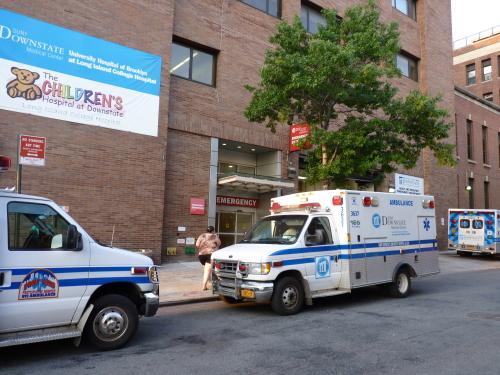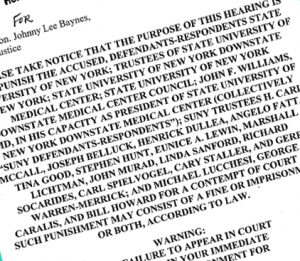
SUNY to vote today on sale of LICH to condo developer — but fight to save hospital goes on
LICH advocates vow to fight closed door deal

SUNY Downstate Medical Center will be pushing ahead on Tuesday with its long-contested plan to sell Long Island College Hospital (LICH) to a real estate developer, a move fought by advocates for LICH for almost a year.
SUNY is expected to name the developer at a special meeting of the SUNY board on Tuesday in Manhattan. LICH supporters told the Brooklyn Eagle they planned to attend the meeting.
With an RFP (Request For Proposals) process carried out entirely behind closed doors, SUNY claims that only one viable response was received in its search for a new hospital operator.
Expressing grave concern with the secrecy shrouding SUNY’s process, a number of Brooklyn officials sent a letter to Governor Andrew Cuomo on Monday asking for an RFP redo. They also want to limit applicants to those planning to maintain a full-service hospital.
The developer chosen by SUNY plans to lease much of the main hospital building to various unnamed healthcare businesses who would provide health-related services, such as a “fitness center” and an urgent care facility, but no hospital, H. Carl McCall, chairman of the university trustees, told the New York Times on Monday.
The remaining 20 or so LICH buildings would be turned into condominiums.
Jim Walden of Gibson, Dunn & Crutcher, representing LICH advocates including Bill de Blasio and six community groups, told the Eagle on Friday, “If SUNY selects a party for the RFP award, it is not the end of the RFP process: they still need a period of time to actually negotiate a contract. During that time, we will explore every possible legal option, including the viability of a new lawsuit on everyone’s behalf to block the contract.”
Jill Furillo, executive director of the New York State Nurses Association, told the Eagle late Monday, “NYSNA’s position has always been, and remains, that Long Island College Hospital must stay open as a full-service facility.
“SUNY has made it clear that it is not concerned with the healthcare needs of the community — it has sabotaged care at LICH by unlawfully diverting ambulances, violating no fewer than seven court orders, draining the hospital of resources and wreaking havoc on healthcare throughout all of Brooklyn,” Furillo said. “We will fight to maintain Long Island College Hospital as the full-service facility that the community depends on for care.”
Health advocates fear that cash-strapped SUNY Downstate has made a decision many consider crucial to the future of northwestern Brooklyn based on “monetizing” LICH’s valuable real estate holdings, rather than taking the needs of the fast-growing area into account.
LICH serves a swath of Brooklyn ranging from Red Hook to Williamsburg, including Downtown Brooklyn -– all areas exploding with new residential and business development.
In the next two and a half years, 4,746 residential units will be completed in Downtown Brooklyn alone, almost doubling its population, according to a study by the Downtown Brooklyn Partnership. Residential towers and hotels are going up in Brooklyn Heights proper and in Brooklyn Bridge Park, in Gowanus and in Williamsburg.
Health advocates are troubled by the fact that no assessment of the neighborhoods’ health needs has been carried out and that the traditional role played by LICH in providing “surge capacity” during disasters like September 11 and Superstorm Sandy has been overlooked.
One area hard hit by closing LICH would be Red Hook, a federally designated “Health Professional Shortage Area” even during good times.
Jeff Strabone, spokesperson for the Cobble Hill Association, said on Monday, “SUNY has conducted its RFP process in total darkness: away from the public and the courts. Now they announce their unilateral decision. Not one assessment of public health needs has been done and not one consideration of disaster-preparedness. LICH is essential every day but especially in the event of another Sandy-type storm or 9/11-type event in lower Manhattan.”
He added, “Medical decisions should be based on need, not greed. By closing LICH as a hospital, SUNY is putting the entire region at risk of a catastrophic event. The regional network of hospitals will be overcrowded daily and overwhelmed in the event of disaster.”
Despite numerous court orders to keep LICH in operation, SUNY’s actions -– closing units, ending LICH’s residency program, placing ambulances on diversion, refusing to admit patients, hiring hundreds of armed guards, not renewing doctors’ contracts –- have cost LICH millions of dollars in revenue and are the subject of a contempt hearing before state Supreme Court Justice Johnny Lee Baynes scheduled for January 21.
Any deal to transfer the hospital will require approval from state Supreme Court Justice Carolyn Demarest.
In 2011, Justice Demarest granted the petition allowing LICH to transfer its assets to SUNY on the condition that SUNY would keep LICH a functioning hospital. When SUNY announced its plans to close LICH and began shutting down operations, however, Justice Demarest expressed serious doubts about the original transfer.
Tuesday’s SUNY board meeting takes place at the College of Optometry, 33 West 42nd Street in Manhattan at 2 p.m.
SUNY did not respond to an email requesting more information.
Leave a Comment
Leave a Comment







